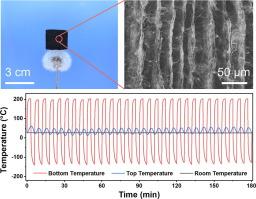结构弹性碳纳米纤维气凝胶由芳纶纳米纤维在极端条件下的保温
IF 13.2
1区 工程技术
Q1 ENGINEERING, CHEMICAL
引用次数: 0
摘要
由于其独特的微观结构,轻质气凝胶被认为是先进的隔热材料,适用于各种应用。然而,开发在大范围温度波动和机械应力下保持结构完整性的高弹性气凝胶绝缘体仍然是一个重大挑战。在这项工作中,我们报道了通过三维组装的纳米纤化芳纶纳米纤维(ANFs)的碳化合成的跨尺度结构工程碳纳米纤维气凝胶(CNFAs)。纳米纤化的纳米纤维保留了凯夫拉纤维的高结晶度特性,使得纳米碳纤维具有更强的结构规整性和机械坚固性。由此产生的CNFAs具有超低密度(3.8 mg/cm3),具有分层、相互连接的纳米纤维细胞结构,具有卓越的结构弹性和耐久性。它们具有优异的隔热性能,室温下的导热系数为19.93 mW/m·K。此外,它们在- 196 °C至1000 °C的宽温度范围内表现出优异的机械稳定性,在极端条件下保持结构完整性。出色的结构弹性和隔热能力使这些cnfa在极端环境中的热管理方面特别有前景,例如航空航天应用、工业炉和低温系统,在这些环境中,机械耐久性和可靠的热保护至关重要。本文章由计算机程序翻译,如有差异,请以英文原文为准。

Structurally resilient carbon nanofiber aerogels from aramid nanofibers for thermal insulation under extreme conditions
Lightweight aerogels are recognized as advanced thermal insulators for diverse applications due to their unique microstructure. However, developing highly resilient aerogel insulators that maintain structural integrity under wide temperature fluctuations and mechanical stresses remains a significant challenge. In this work, we report cross-scale, structurally engineered carbon nanofiber aerogels (CNFAs) synthesized through the carbonization of three-dimensionally assembled nanofibrillated aramid nanofibers (ANFs). The nanofibrillated ANFs preserve the high crystallinity characteristic of Kevlar fibers, resulting in carbon nanofibers with enhanced structural regularity and mechanical robustness. The resulting CNFAs, with an ultralow density (<3.8 mg/cm3), exhibit a hierarchical, interconnected nanofibrous cellular architecture that imparts exceptional structural resilience and durability. They demonstrate superior thermal insulation performance, with a thermal conductivity of 19.93 mW/m·K at room temperature. Additionally, they exhibit excellent mechanical stability over a wide temperature range from −196 °C to 1000 °C, maintaining structural integrity under extreme conditions. The combination of outstanding structural resilience and thermal insulation capabilities makes these CNFAs particularly promising for thermal management in extreme environments, such as aerospace applications, industrial furnaces, and cryogenic systems, where both mechanical durability and reliable thermal protection are crucial.
求助全文
通过发布文献求助,成功后即可免费获取论文全文。
去求助
来源期刊

Chemical Engineering Journal
工程技术-工程:化工
CiteScore
21.70
自引率
9.30%
发文量
6781
审稿时长
2.4 months
期刊介绍:
The Chemical Engineering Journal is an international research journal that invites contributions of original and novel fundamental research. It aims to provide an international platform for presenting original fundamental research, interpretative reviews, and discussions on new developments in chemical engineering. The journal welcomes papers that describe novel theory and its practical application, as well as those that demonstrate the transfer of techniques from other disciplines. It also welcomes reports on carefully conducted experimental work that is soundly interpreted. The main focus of the journal is on original and rigorous research results that have broad significance. The Catalysis section within the Chemical Engineering Journal focuses specifically on Experimental and Theoretical studies in the fields of heterogeneous catalysis, molecular catalysis, and biocatalysis. These studies have industrial impact on various sectors such as chemicals, energy, materials, foods, healthcare, and environmental protection.
 求助内容:
求助内容: 应助结果提醒方式:
应助结果提醒方式:


